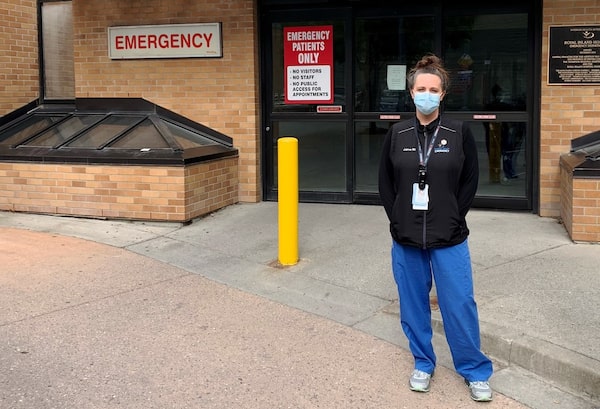
Jaime Gallaher outside of the Royal Inland Hospital in Kamloops, B.C., on July 30, 2021.HO/The Canadian Press
COVID-19 may or may not be becoming endemic, but a shortage of health care workers seems to be reaching that stage. In Canada, the United States and around the world, workers are quitting, frequently referencing that they are exhausted and burnt out from jobs that ask them to cope with an unrealistic workload. “Burnout” is actually being referenced by workers in a multitude of industries as they either resign or think hard about doing so, and the number of unfilled jobs soars. Perhaps, though, what they are calling burnout is actually something more properly termed “moral injury,” and which seems to be the catalyst for workers demanding more from their employers – and not just in terms of direct compensation.
The phrase “moral injury” first came about when researchers studied the experience of soldiers who had been through wars, with “moral” used to distinguish their injuries from physical ones. Loosely defined, it speaks to the trauma people experience in the workplace by being asked to do things that run against their own moral beliefs and which could end up hurting other people. This can happen in a dramatic way, such as when workers at an aircraft manufacturing plant are asked to ignore what they consider safety concerns and allow planes to get into the air to meet quarterly targets. However, moral injuries can also occur in situations that may seem more mundane, but which are not any less wounding for the individuals that experience them.
Writing about moral injuries in the Harvard Business Review, researchers Ron Carucci and Ludmila N. Praslova note that moral injuries are a sort of “social pain” and that it is processed in the same part of the brain as physical pain. Their research also shows that when workers do not have adequate resources to do the job they want to do, they experience that pain and incur moral injuries because they are distressed at not being able to do what they feel they have been hired to do and what they should be doing. That goes some way to explaining why health care workers are unhappy given that they are overworked and underresourced, and in many cases unable to take care of patients the way that they would like.
Teachers are another example of this, with a 2019 study finding that some teachers exhibited levels of moral injury similar to those experienced by military veterans. This was especially true for teachers working in high-poverty areas where they wanted to make a difference, but felt guilty that they did not have the resources to do so.
For those in other professions, moral injuries can come in small and large forms. It may be that a manager feels pressured to reassure a client that all is well with his account when she knows that it is not, or perhaps when she is encouraged to tell a white lie about how much the company can afford to give a worker asking for a raise.
Organizations should take note: the research by Mr. Carucci and Dr. Praslova also shows that when people feel like they are forced into unfair or undignified conditions, they are four times more likely to be dishonest or act in their own self-interest than workers who are not treated in that way. In other words, workers who experience a moral injury may quit, but if they stay they are damaged in some way and may take it out on the organization.
Unfortunately, there is no quick fix to removing the conditions that cause moral injuries. In some organizations it would take a full makeover of management, and in industries such as health care it will take spending large sums of money to make sure that workers have adequate resources to do their jobs properly. The time may be right to talk about the issue, however. Coming out of two years of pandemic, workers have changed. A 2021 survey by McKinsey found that nearly two-thirds of workers surveyed said that COVID-19 had caused them to reflect on their purpose in life. By extension, that had them considering what kind of work they wanted to do and, presumably, the kind of company they wanted to work for.
The unemployment rate is at its lowest level in decades, vacancies are at a high and workers can afford to think hard about where they want to work. Compensation may be part of making them happy in their workplaces but shielding them from being morally injured may be a part harder to see, but ultimately just as important.
Your time is valuable. Have the Top Business Headlines newsletter conveniently delivered to your inbox in the morning or evening. Sign up today.
 Linda Nazareth
Linda Nazareth